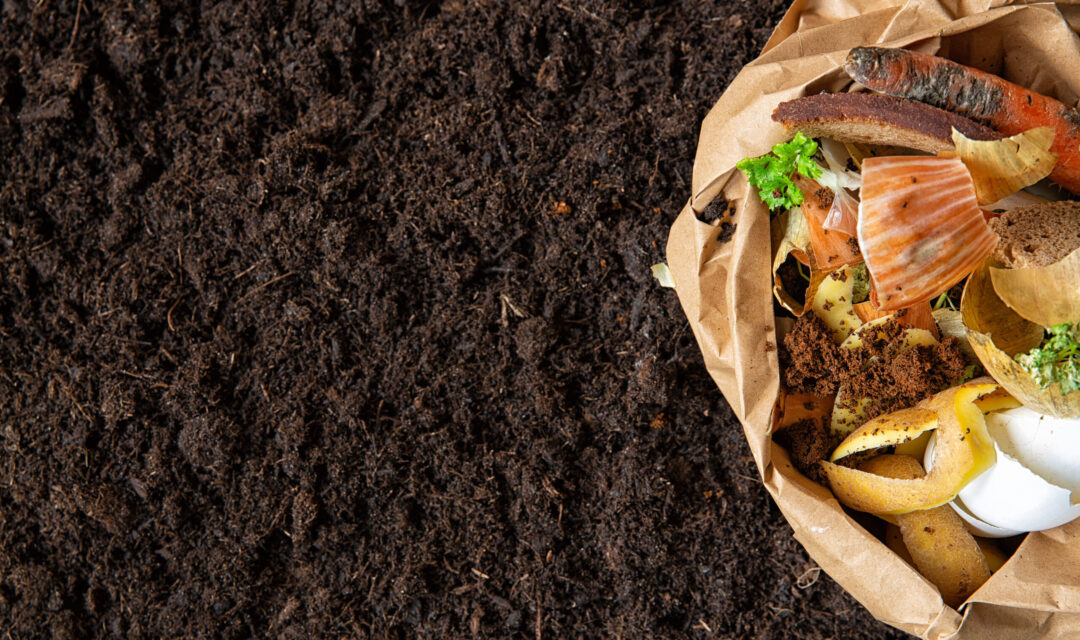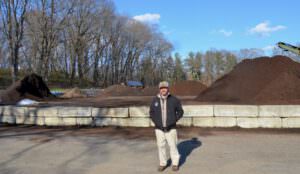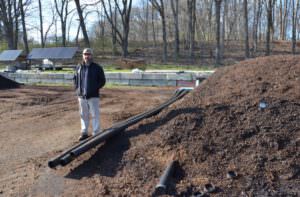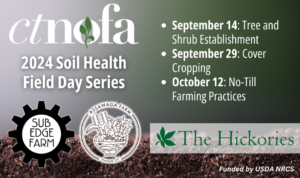New England Composting – From Food Waste to Compost

By Monique Bosch
I took a visit to a composting business that prides itself on utilizing local food waste to create a special blend of highly nutritious compost. ‘Diverting food waste’ and ‘highly nutritious’ were key words for me, so I jumped in the car to check it out. Driving into an unassuming backyard along a residential street in Danbury, I was surprised to see the orderly piles of compost and mulch, along with heavy equipment, neatly organized.
Below: Jeff stands in front of his composting facility, neatly tucked away, with no smell or mess.

I met Jeff, taking a break from moving piles and loading trucks. First question; “how did all this come about?”
“I was working in the landscaping industry when I met Don Taylor from Taylor farm, the property I’m on right now. He had woodchips, logs, and brush and I had a desire to compost. I cleaned up the site, brought in leaves, and started producing a high carbon, wood-based compost. Then the horse manure started coming in.”
In 2014, Connecticut’s legislature enacted a law that requires businesses that produce 1 ton or more of food waste to recycle it, if they’re within 20 miles of a facility that’s licensed to handle it. This new law made it feasible for Jeff to alter his permit to include food waste.
Jeff then took the formula further, adding other waste products that were locally available.
“There are some unique feedstocks out there that make for unique compost,” Jeff explained. He increased his inputs to include waste from several local businesses: Bigelow Tea (tea and botanical waste), Ideal Fish in Waterbury (whole fish, fish manure), Sunset Hill Farm (horse manure) and Lesser Evil Snack (organic popcorn). The end result was a high-quality compost product with diverse and complex sets of nutrients.
Jeff makes his compost in small batches, with great attention to detail and quality. His Thermophilic compost system is unique in that it uses a 100% solar-powered aeration system. Jeff mixes his feedstocks to correct ratios, then places the mixture on perforated pipes. Using a 1½ horsepower blower, he runs air under the rows, 2 minutes on, 28 minutes off, for 30 days. He can tweak the amount of time the blower is on, depending on the density of the pile, and temperature. This control over air and temperature ensures that the rows never go ‘anaerobic’, which leads to a higher quality finished compost.
Below: Jeff stands beside perforated pipes ready for the next load of waste materials.

The thermometer is visible in the active pile to the right, solar panels generating energy to run the aeration system on the left.
Jeff keeps the row temperature at 140-150 degrees for 30 days.
After 30 days he’ll flip the row and put it back on the air for an additional 14 days, to guarantee pathogen/weed/parasite destruction. He’ll then cure the pile for 90-120 days.
The most satisfying aspect of composting all of these local waste products is the knowledge that all of these feedstocks were destined for either landfill or would have been burned at a waste incineration plant. Instead, they are part of a unique recipe that makes Jeff’s New England Compost product highly nutritious for plants. We took a look under the microscope to examine the life in the compost:
Below: Video of finished New England Compost. Plenty of diverse bacteria & soil aggregates.
Jeff is starting to see more people wanting to do their own composting, but says the biggest stumbling block is keeping the food waste free of contaminants.
“Those who are saving food waste for pickup should lookout to produce ‘stickers’ and bags. Keep in mind ‘if you can eat it, I can compost it’.” Haulers are educating consumers on best practices and it’s starting to be evident in the food waste Jeff receives from households. “4 years ago the volume of contamination meant that I just couldn’t use it. It was too expensive to cleanout. Now more people are gardening and thinking about compost as a key ingredient in their garden soil. The importance of high-quality compost is starting to be noticed and appreciated.”
Recent Posts
CT NOFA Announces 2024 Slate of Soil Health Field Days
Beginning in late summer, CT NOFA will host three field days centered on soil health…
Read MoreCT NOFA Board Member, Freedom Gerardo, Featured on New Hampshire Public Radio
CT NOFA board member, Hector “Freedom” Gerardo, was recently featured on New Hampshire Public Radio’s…
Read More


